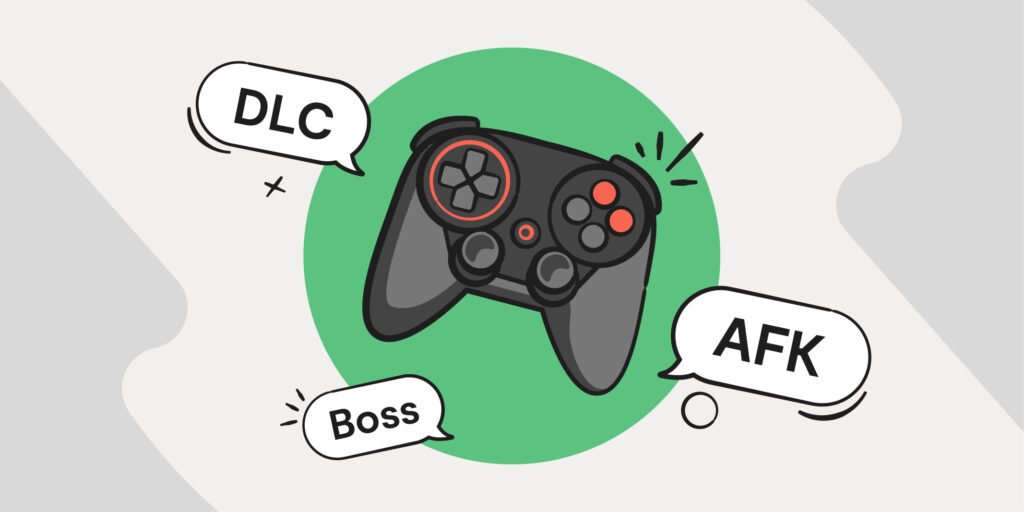Level Up Your Lingo: The Essential Gaming Slang You NEED to Know!
Ever felt like you've dropped into a foreign land when listening to gamers chat or watching an intense E-sports match? The world of online gaming is rich with its own unique gaming slang, a rapidly evolving language that can feel impenetrable to the uninitiated. From quick acronyms in chat to complex strategic calls, gamer terms are an integral part of the culture, essential for seamless communication, understanding memes, and even excelling in competitive play.
Whether you're a curious parent, a budding streamer, or a new player looking to dive headfirst into the digital arena, mastering this gaming vocabulary is your cheat code to blending in and maximizing your experience. This article will decode the most common and crucial gaming jargon, ensuring you're never left saying “huh?” in the middle of an epic moment.
Why Speak “Gamer Slang”? It's More Than Just Inside Jokes
Understanding gaming slang isn't just about being cool (though it may be helpful at times). It serves several critical functions in the gaming community:
- Efficiency: In fast-paced games, quick communication is vital. Acronyms and shorthand convey complex ideas in milliseconds.
- Community Building: Shared language fosters a sense of belonging and camaraderie among players.
- Understanding Content: From Twitch streams to YouTube game reviews, gaming phrases are ubiquitous. Knowing them unlocks a deeper appreciation of the content.
- Competitive Edge: In E-sports lingo, precise terms can be the difference between victory and defeat.
Furthermore, Let's dive into the video game dictionary!

The Fundamentals: Essential General Gaming Terms
These are the building blocks, terms you'll encounter across almost every genre and platform.
- GG / GGWP: “Good Game” / “Good Game, Well Played.” A universal sign of sportsmanship, usually typed at the end of a match. Be careful with “GGEZ” (“Good Game, Easy”) – it's often used to mock opponents.
- AFK: “Away From Keyboard.” Means a player is temporarily inactive or away from their device.
- BRB: “Be Right Back.” Similar to AFK, but implies a shorter absence.
- Noob / Newb / N00b: A derogatory term for a new or inexperienced player, often used dismissively. Best avoided unless with close friends.
- Buff / Nerf: These refer to changes made to characters, weapons, or abilities in a game. A Buff makes something stronger, while a Nerf makes it weaker, usually for game balance.
- DLC: “Downloadable Content.” Extra content for a game, often purchased separately (e.g., new characters, levels, cosmetics).
- NPC: “Non-Player Character.” Characters controlled by the game's AI, not by a human player.
- FPS: “Frames Per Second” (technical term, but used to describe game smoothness) OR “First-Person Shooter” (a genre, e.g., Call of Duty, Valorant). Context is key!
- HP / MP / XP: “Health Points” (or Hit Points), “Mana Points” (or Magic Points), “Experience Points.” Common stats in RPGs and other genres.
- RNG: “Random Number Generation.” Refers to anything in a game determined by chance, like loot drops or critical hit probability. Often used when luck (good or bad) plays a role (“That boss drop was pure RNG!”).
- Lag: A delay between a player's action and the game's response, usually due to internet connection issues. Causes frustration!
- Grinding / Farming: Performing repetitive tasks in a game (e.g., killing enemies, collecting resources) to gain experience, currency, or items.
- OP: “Overpowered.” Describes a character, weapon, or ability that is too strong or unbalanced compared to others.
- Meta: Short for “Most Effective Tactics Available.” Refers to the current dominant strategies or character choices in a game's competitive scene.
- Camping: Staying in one strategic location, often hidden, to ambush opponents or gain an advantage. Can be considered a “cheap” tactic by some.
- GG EZ: Good Game, Easy. This is often used by players to taunt or belittle their opponents after a match, implying that the victory was easy or that the other team was not skilled.1
In the Heat of Battle: Competitive & Esports Slang
When the stakes are high, specific esports terminology comes into play, especially in MOBAs (Multiplayer Online Battle Arenas) and competitive shooters.
- DPS: “Damage Per Second.” Can refer to a character's role (a “DPS” character focuses on dealing damage) or the rate at which damage is inflicted.
- Tank: A character designed to absorb a lot of damage and protect teammates.
- Healer / Support: Characters focused on restoring health or providing beneficial effects to allies.
- AoE: “Area of Effect.” An attack or ability that affects multiple targets within a specific area.
- CC: “Crowd Control.” Abilities that hinder enemy movement or actions (e.g., stun, slow, root).
- Gank: A surprise attack by one or more players on an unsuspecting enemy, often from an unexpected direction.
- Push: To advance aggressively into enemy territory, often to destroy an objective.
- Dive: To aggressively pursue an enemy, often into a dangerous position or deep behind enemy lines.
- K/D / KDA: “Kill/Death Ratio” / “Kills, Deaths, Assists.” Metrics used to measure player performance in combat-focused games.
- Clutch: A highly skilled play made under intense pressure, often leading to a win against unfavorable odds.
- Ult / Ultimate: A character's most powerful ability, usually on a long cooldown.
- Smurf: A highly skilled player who uses a new or lower-ranked account to play against less experienced opponents.
- Tilt: A mental state where a player becomes frustrated, leading to poor decision-making and performance.
- LFG: “Looking For Group.” Used to find other players to team up with.
Role-Playing Realm: RPG and MMORPG Jargon
Immersive worlds come with their own set of unique terms for adventurers and quest-takers.
- Aggro: Short for “aggression.” Refers to an enemy's attention or focus on attacking a particular player. “I've got aggro!” means the enemy is attacking me.
- Mobs: Short for “mobile objects.” Refers to any non-player enemy creatures in the game, often encountered in groups.
- Loot: Items dropped by defeated enemies or found in the game world, often valuable.
- Quest: A task or mission given to the player, usually with rewards upon completion.
- Dungeon / Raid: Instanced areas designed for groups of players to tackle challenging enemies and bosses for high-tier loot. Raids are typically larger and more complex than dungeons.
- Grind: Repetitive actions to gain experience, currency, or items.
- BiS: “Best in Slot.” Refers to the absolute best piece of equipment for a particular gear slot for a character.
- Crafting: The process of creating items or equipment using collected materials.
- Proc: “Programmed Random Occurrence.” When an effect or ability triggers based on a chance or condition (e.g., a weapon has a chance to “proc” a burn effect).
Streamer Speak and Community Catchphrases
Twitch and YouTube have their own vibrant communities, giving rise to unique slang that often transcends specific games.
- Emote: Custom images or animated GIFs used in chat to express emotions or reactions (e.g., Kappa, Poggers, LUL).
- Raid: When a streamer finishes their broadcast and sends their viewers en masse to another streamer's channel.
- Bits / Cheers: Virtual currency purchased by viewers to support streamers, often displayed as animated “cheers” in chat.
- Sub / Subscribing: Paying a monthly fee to support a streamer, often granting access to exclusive emotes and other perks.
- Dono: Short for “Donation,” a direct monetary contribution to a streamer.
- IRL: “In Real Life.” Used to denote content or discussions about real-world events, outside of gaming.
- Hype: Expressing excitement or enthusiasm, often accompanied by a “Hype Train” (a community event where viewers collectively support a streamer).
- Troll: Someone who intentionally disrupts discussions or annoys others online for their own amusement.
- Clip: A short video segment taken from a stream, highlighting a funny or impressive moment.
- F: Often typed in chat to “pay respects,” originating from a Call of Duty meme.
Your Journey to Gaming Fluency: Tips for Learning Slang
- Listen Actively: Pay attention to how others use terms in game chat, voice comms, and streams.
- Context is King: The meaning of some terms can shift slightly depending on the game or situation.
- Don't Be Afraid to Ask: Most communities are welcoming to new players. A quick “What does that mean?” can save you confusion.
- Immerse Yourself: The more you play and engage with gaming content, the more naturally the slang will come.
- Use Online Resources: Gaming wikis and dedicated slang dictionaries are excellent tools for looking up unfamiliar terms.
The Ever-Evolving Lexicon of Play
The world of gaming is dynamic, and its language is no different. New games, communities, and viral moments constantly give birth to fresh slang, while older terms fade away. By familiarizing yourself with this essential gaming vocabulary, you're not just learning words – you're gaining access to a rich, global culture. So go forth, GG, and GLHF on your linguistic adventure!







